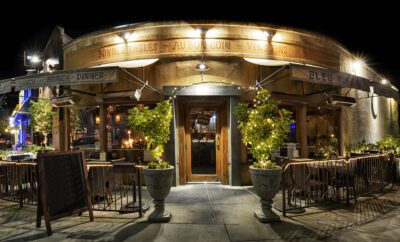Lifestyle
Interview with Dr. David Simon, San Diego Chopra Center
 Home to the inventor of the World Wide Web, creator of scores of technological products medical breakthroughs, the United States has much to be proud of.
Home to the inventor of the World Wide Web, creator of scores of technological products medical breakthroughs, the United States has much to be proud of.
Yet, in the area of healthcare, it seems we fall behind. Few people have the funds to access those medical breakthroughs and life-preserving technologies. But beyond healthcare disparities, it is Western medicine philosophy that is in need of a cure. Presently, doctors are trained to treat symptoms, not to heal sicknesses and the idea that there is a pill to ease every ailment has warped the overall health of our country.
World-renowned mind-body physician and co-founder of the Chopra Center in San Diego, Dr. David Simon confronts this misconstrued attitude towards health unveiling the underlying causes of illnesses in his new book Free to Love, Free to Heal.
A 30-year veteran in the medical field, Simon always knew he wanted to be a doctor. Choosing a bachelor of the arts in anthropology, Simon sought to understand medicine and healing from a global perspective.
“I learned from the beginning of human culture around the world, doctors were always more than disease technicians” Simon told me. “The traditional doctors were part priests, part psychologist, part herbalist and they were comfortable navigating a lot of different dimensions of life. I entered medical school with the idea that medicine was not just about treating a disease with pharmaceuticals but about uncovering an underlying problem in a person’s ecosystem, which includes their environment, their relationships their job, their body, and their mind. My understanding of healing was by figuring out where the problem was and then being able to create the opportunity for healing in that area.”
Reminiscing, Simon was disappointed by his experience in medical school. He found that conventional medical training teaches doctors to look at people like biochemical bags and molecular beings, so that for every symptom there’s a prescription.
“The focus was on biochemistry,” he said, “what was the person’s sodium level, what was their cholesterol level – not is the person happy in their marriage or do they like their job? It was demoralizing how materialistic the medical approach was.”
Already a yoga and meditation teacher while attending school, Simon took the Western philosophy of medicine and made it his life work to integrate it with Eastern philosophy of healing from within. The product of his interwoven approach to healthcare is illustrated in Free to Love, Free to Heal.
In his book, Simon first explains that inside every physical and mental illness underlies emotional malnourishment.
“Emotional pain with eventually manifest as not only a psychological illness but as a physical illness,” he explains. “I felt for a long time that the body is trying to get attention, and if we ask the question, ‘What is the body needing that it’s not getting?’, it will tell us a story and that story will lead to real authentic, lasting healing transformation.”

Courtesy of trendymums.com
This concept is what Simon calls the “mind-body connection,” which has led to hundreds of patients at the Chopra Center finding wellness – a journey that first begins in their mind.
Running the Chopra Center for over 15 years, everyday Simon sees people suffering from physical symptoms who have tried to treat it on just the molecular level but have not found the curative healing they need. What Simon does is create a safe environment where patients can discuss their childhood experiences, their lives, mental state, anxieties, worries and stress.
“Once the underlying story is released, not only do they feel better, their psychology improves and very often their auto-immune disease become less active, their digestive problems normalize, they’re able to finally lose the weight they been carrying that leads to diabetes and heart disease,” Simon professed.
“I saw a woman a few months ago that was almost incapacitated by irritable bowl syndrome. She was unable to leave the house and she had been to over a dozen different types of doctors and everyone had their own perspective on it. But I saw what was going on in her life when the IBS started. She had just gone though a divorce, there were some core fears about survival, and because of some earlier childhood experiences having to do with her parents always arguing at the dinner table, there was an association between stress and eating, stress and digestion that it had woven this kind of constellation in her body.”
Simon introduced her to the Free to Love course, a 12-hour process of identifying and releasing her underlying emotional issues, then setting the new trajectory.
“After going through the whole program, she called me a two months later and said this is the first time in memory that she’s able to live a normal life,” Simon said joyfully.
By exploring unresolved emotional issues and translating them to mental and physical illnesses, patients can bypass the unnecessary dosages of harmful prescriptions and mounting doctor bills.
Not entirely discounting Western medicine, Simon understands the world needs both, but it’s determining when one medical philosophy better suits an ailment over the other that people need to be aware of.
“If you get into a car accident and you smack your skull and you have a blood clot on your brain, at that point talking about your childhood or taking herbal medicine is not going to do that much good,” Simon said chuckling.
“In those settings the modern technologies we have to diagnose and treat the disease are more powerful.”
Yet there is still room for the infusion of Eastern techniques in Western medicine that provides a helpful balance while working toward wellness.
“Even if someone is having a heart attach, once you save them, talking about stress, diet and lifestyle can clearly play a role, and in some cases, someone who has an entirely stress-based auto-immune issue, a temporary use of an anti-depressant may help them get through that rough patch while they look at choices and changes in their life,” Simon said.
When I asked Simon why there are such large numbers of people with underlying emotional issues, his reply was brilliantly simple.
“Our culture is a culture of consumers,” he explained. “What that really means is that whenever people feel any sense of emptiness in their lives, we’re in a culture where they try to fill that emptiness by buying something by acquiring something. There’s this cultural perspective of get the quickest relief possible to fill that emptiness and the problem is that it never really feels the emptiness.”
In his opinion, Westerners shouldn’t be afraid of emptiness, but accept it.
 “In the traditional Chinese ayruvedic system, emptiness represents faith and if we can embrace faith by meditating, we actually fill the space with awareness and we don’t have to fill it with material things. When people realize they can generate peaceful happiness from within, without having to be obsessive by trying to fill it from without, I think that our consumer consciousness will shift and we will not need to be basically gobbling up the planet in hopes that it will make us feel better about ourselves.”
“In the traditional Chinese ayruvedic system, emptiness represents faith and if we can embrace faith by meditating, we actually fill the space with awareness and we don’t have to fill it with material things. When people realize they can generate peaceful happiness from within, without having to be obsessive by trying to fill it from without, I think that our consumer consciousness will shift and we will not need to be basically gobbling up the planet in hopes that it will make us feel better about ourselves.”
The shift of consumer conscious mirrors another shift Simon is anticipating: the shift in how Americans view healthcare.
“We have to admit – we already have a universal healthcare,” he said. “Ultimately everybody gets health care, the question is do they get health care in the appropriate setting at the appropriate stage or do we wait till it gets so severe that its something that could have been taken care of in the pediatricians office that is now requiring hospitalization for a prolonged state?”
Beyond working to make healthcare more affordable for all citizens, Simon believes we have to look at our own contributions to illness.
“For every major category of disease, addictions, and major psychiatric illness, it all has a substantial lifestyle component and lifestyle is driven by emotion. If someone is feeling good and happy in their lives they are much more likely to make choices that are life supporting and if someone is not feeling happy, then they’ll do whatever it takes to give them a little relief – take drugs, drink too much, eat too much, gamble too much – all the behaviors that provide very limited temporary relief but that then have long term consequences which ultimately translate into real illness.”
The healthcare debate is still in its early stages, and only basic concepts are being considered, such as getting every person covered by an insurance plan. Simon hopes that in the future, the conversation will evolve into a focus on total wellness.
“The substantial conversation should be around how do we help people eat healthier, how do we get them to exercise regularly, how do we help people heal their relationships so their not perpetually fighting the situations of stress, and compel them to behaviors that are not nurturing,” Simon said.
Simon is very optimistic about Western culture, and wants to work toward its mind-body evolution. In Free to Love, Free to Heal , Simon writes for individuals who are ready for mental liberation and physical well-being. By helping individual patients, Simon is ultimately helping his entire community and influencing the future state of Western medicine for the better.
Free to Love, Free to Heal, $22.95, along with information regarding accompanying healing programs, is available at www.chopra.com.





0 comments